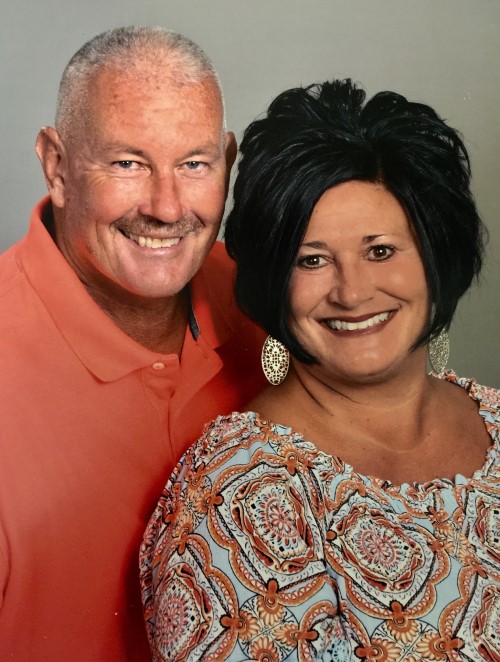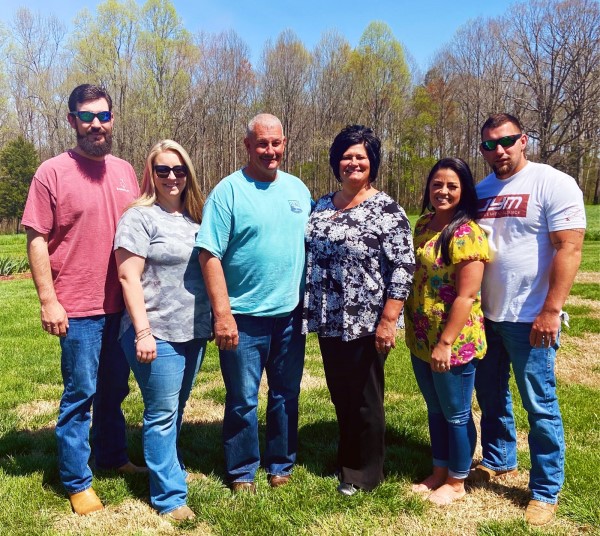
Harmony woman details nine-month battle with COVID-19, advises others to take it seriously
Special to Iredell Free News
Imagine trying to breathe through a straw. Air comes in, but it is nearly impossible to make the air go out. Add a fever, severe headache, and aches and pains to that, and it may leave you feeling on the brink of death.
For Danna Harris, a 56-year-old Harmony resident who generally considered herself to be healthy, it was once her reality.
It started the last few days of 2020, and Harris never could have imagined what her life would be like even now, more than nine months later. Her battle with COVID-19 continues to this day.
She’s come a long way since that fight first started, but despite the progress she’s made, Harris still gets emotional talking about her experiences.
Harris first began feeling ill around the start of the new year, a few days after a colleague also had started to feel sick. When she recognized she had some of the tell-tale symptoms of COVID-19, including a fever of 102 degrees Fahrenheit and loss of taste and smell, she made a trip to a local urgent care center to be tested. Healthcare providers confirmed her suspicions and also diagnosed her with pneumonia. That was on Sunday, January 3.
“It was really bad,” she said. “I was very sick. It began with aches and pains and just not feeling good overall, sort of like the flu. I also had chills from the fever I had.”
As the days progressed, so did her symptoms, and she continued to feel worse. Five days later, on January 8, she returned to urgent care. Harris now had double pneumonia on top of everything else.
Concerned urgent care providers encouraged her to go to a hospital for more advanced treatments. Harris had never been one to run to a hospital for every ache and pain though and, knowing hospitals were full and under a lot of strain from COVID-19 patients, she opted to go home instead.
By Monday, January 11, Harris started developing breathing problems, and knew it was time to make that trip to the hospital.
“I just couldn’t get my breath, and that was while I was just sitting,” she said. “I just kept getting worse. My fever was going up, and I could not get air. It was like trying to breathe by sucking through a straw. It was so bad I knew I needed to go to the emergency room. I’d never been this sick.”
After receiving oxygen and IV fluids at Iredell Memorial Hospital, Harris was discharged as part of the nonprofit organization’s “Hospital at Home” program. Equipped with a tablet that required her to regularly answer health-related questions and a pulse oximeter to detect her oxygen levels, she went home. Harris’s vitals were monitored from afar by healthcare clinicians at Iredell Health System.
Just 72 hours later though, Harris was getting worse and her oxygen levels dropped to 72. She was also vomiting and had a fever over 103 degrees Fahrenheit. And she was battling a severe headache that made her feel like she’d been hit in the head with a baseball bat.
“I really thought this was it,” she said. “I didn’t think I was going to make it. I could breathe in, but I was struggling to breathe out. The whole time it was just like I was suffocating – that’s when it got scary.”
Then someone from the hospital who had seen her vital signs called.
“They said, ‘We’re sending an ambulance – you have to come in.’ ”
Harris opted to have her husband bring her instead. She was admitted to Iredell Memorial that day, and started on a five-day treatment course of Remdesivir. She was also put on oxygen, used an inhaler, and had other breathing treatments during her hospitalization.
“Within 24 hours of being at the hospital I could feel a difference,” she said. “That oxygen was a lifesaver – I could finally breathe.”
During her five-day hospitalization Harris was slowly weaned off the supplemental oxygen before being discharged. She didn’t return to work until February 17, more than a month after her symptoms first started.
“I was so weak,” she said.
Her pulmonologist – a doctor she had never had a need to see before contracting COVID-19 – had warned Harris that it may take her a few weeks to really start to feel better. But Harris couldn’t shake the fatigue she was experiencing.
“I would sleep seven or eight hours a night, but I was still exhausted,” she said.
Turns out there was an explanation for that exhaustion. A sleep study revealed Harris stopped breathing an average of 57 to 59 times per hour in her sleep. She now sleeps with a CPAP machine to ensure she continues to breathe throughout the night. She’d never had problems with sleep before, which led her doctors to one conclusion – it was a long-term side effect of her battle with COVID-19.
Unfortunately, that’s not the only lingering effect.
“For a while, at night I would have bad, bad dreams where I was trying to get help for people with COVID, but I felt like I couldn’t get anywhere to help anyone. My husband would wake me up and I’d be crying.”
And she’s still not back to her pre-COVID health.
“The breathing gets better as I go, but it’s taking time. My energy still isn’t very good,” she said. And, her doctor has told her that another bout with COVID may not end well for her since she’s still weak and her lungs are so damaged.
“He showed me my X-rays. It looks like there are cotton balls on the bottom portion of my lungs, sporadically placed. He said it may be permanent scarring,” she said, adding that he encouraged her to get vaccinated as an extra layer of protection.
But Harris had been hesitant to get the COVID vaccine, despite learning about it from family members and friends in the healthcare field, seeing her own X-rays and speaking with her doctor.
“I was very skeptical. I’m not against vaccines and haven’t questioned other ones like polio or flu or pneumonia, but this was different. This was something new to me and I was concerned about what was in the vaccine,” she said. “But then, the more I thought about it, the more I thought about how I don’t know what’s in a lot of things, but I still use them. I don’t know what’s in everything I eat, but I still eat it.”
It wasn’t until an unvaccinated family member was diagnosed with COVID-19 and that person’s spouse, who is vaccinated, was not, that she changed her mind.
“That hit a little closer to home. Then I thought I better go ahead and get this to protect me from having even worse symptoms should I get COVID again,” she said.
Harris had some fatigue and a headache after receiving her vaccination, but she said it was nothing compared to what she had already been through, and it’s a decision she does not regret.
“I’m glad I did it,” she said, adding that her decision prompted her sister and mother to be vaccinated as well. “I’m glad that decision is behind me, because it’s been a constant prayer – every day it’s been a prayer of what do I do and asking God to guide me to do what’s best for my family and my health. I kept looking and praying for a sign and then I felt like I had one.”

As she reflects on the last nine months and the current state of the pandemic, Harris encourages others to be more selfless in their decision making.
“I just wish that people would come to a realization that life has changed as we knew it. I really believe that. I just want people to think about others,” she said, adding that the purpose of wearing masks, washing hands and staying socially distanced isn’t just about protecting yourself.
“You need to keep others healthy as well. You could be a carrier and not realize that you’re a carrier until you’ve already exposed everyone you’ve been in contact with. It’s irresponsible and self-centered for people not to care about this.”
She also wants people to start taking COVID-19 more seriously overall.
“If they had to walk a day in the footsteps of a nurse or a doctor caring for COVID patients, or be a fly on the wall in an ICU room watching a patient on a ventilator who has to lay on their belly to be able to breathe, maybe that would be a wakeup call,” she said through tears.
Most of all, though, she hopes others will learn from her personal experience.
“You don’t want to be where I’ve been.”
About Iredell Health System
Iredell Health System includes Iredell Memorial Hospital; Iredell Mooresville; Iredell Home Health; Iredell Wound Care & Hyperbaric Center; Community and Corporate Wellness; Occupational Medicine; the Iredell Physician Network and more. Iredell Memorial Hospital is the largest and only nonprofit hospital in Iredell County. The comprehensive healthcare facility has 247 beds; more than 1,700 employees; and has 260 physicians representing various specialties. Centers of excellence include Women’s and Children’s; Cardiovascular; Cancer; Surgical Services and Wellness & Prevention. The Health System’s newest campus, Iredell Mooresville, is home to the area’s only 24-hour urgent care facility, as well as an ambulatory surgery center, imaging center, rehabilitation services, and physician practices. The mission of Iredell Health System is to inspire wellbeing. For a comprehensive list of services and programs, visit www.iredellhealth.org.




This was a great article. You went through a lot, but I’m glad you are on the mend and got your vaccine.